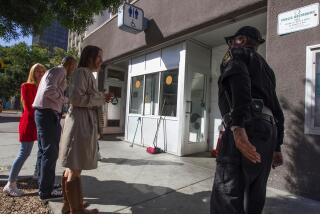Aiming to be a fixture in China
- Share via
Ditmar Gorges thought selling his water-free urinals in China would be a no-brainer, given that country’s water and sewage problems. But he soon discovered it wasn’t easy hawking his product to customers who recalled the “water-free” toilets of their youth: a smelly hole in the ground.
It took months of lobbying before Los Angeles-based Falcon Waterfree Technologies installed its first urinal in the Ministry of Science and Technology’s new headquarters in Beijing, a conservation showplace. Since then, the company has placed its urinals in some of the country’s biggest airports and hotels, where officials are competing to impress Olympic visitors with their high-tech gadgets.
For the record:
12:00 a.m. May 27, 2006 For The Record
Los Angeles Times Saturday May 27, 2006 Home Edition Main News Part A Page 2 National Desk 0 inches; 31 words Type of Material: Correction
Water-free urinals: An article in the Small Business: Innovation special section May 16 about water-free urinals misidentified Sloan Valve as a division of American Standard Cos. Sloan is an independent company.
“China was known for years for having very smelly and unpleasant bathrooms,” said Gorges, who is based in Manila and heads up Falcon’s Asia sales. “Now, we see a trend in the opposite direction: Officials are trying to come up with very unique designs.”
However, breaking into a country of 1.3 billion people with vast disparities in income levels, consumer tastes and geography is daunting. China is a huge market for luxury brands such as Mercedes-Benz and Gucci, but much of the population still doesn’t have indoor plumbing. Environmental awareness is starting to take hold, but the country is home to some of the world’s most polluted cities and waterways.
Foreign businesspeople face a maze of red tape and widespread corruption.
Still, small businesses interested in tackling the Chinese market have a powerful ally in the Bush administration, which is anxious to boost U.S. exports to offset the Chinese imports flooding into the United States.
Israel Hernandez, director general of the U.S. Commercial Service, said his agency, part of the Commerce Department, was interested in helping smaller firms recognize opportunities in countries such as China and India.
“Two billion competitors also means 2 billion customers,” he said. “Ninety-five percent of the world’s consumers are outside the United States.”
U.S. businesspeople can walk into one of the Commercial Service’s 200-plus offices in the U.S. or abroad and get help developing a business plan and identifying prospective markets or business partners overseas. Information about these services is available at www.export.gov. The government charges a fee for this service, but it is a fraction of what it would cost to hire a consulting firm.
Though companies such as Boeing Co. and Microsoft Corp. dominate the China business news, Hernandez pointed out that 90% of the U.S. companies exporting to China were small and medium-sized. But he said many firms might not have the time and money to invest in costly research or overseas trips.
The government recently established the U.S.-China International Partner Network, which provides information about 14 large Chinese cities that are less well-known than Shanghai or Beijing.
Falcon executives said the U.S. government’s assistance was particularly valuable in China and Japan, where personal relationships are essential to business. Gorges said U.S. commercial officers had written letters of introduction to key customers and government officials and steered the company away from questionable deals.
“They’ve really opened the doors for us,” said Gorges, a civil engineer who launched Falcon Waterfree in 2000 after splitting up with his partner in a similar company. That firm, Vista, Calif.-based Waterless Co., is also a major player in the water-free urinal market.
To accelerate his global expansion, Gorges picked up some high-powered backing. Billionaire Marc Nathanson, a cable TV pioneer, is the firm’s majority shareholder and chairman. Former EBay Inc. President Jeff Skoll recently bought a 25% interest in Falcon for an undisclosed amount. The firm’s advisory board includes former Vice President Al Gore and former Los Angeles Mayor Richard Riordan. Gorges retains a minority stake in the firm.
The small company also has partnered with some of the world’s leading bathroom equipment manufacturers, including Sloan Valve, a division of American Standard Cos., which has operations in China.
Water-free technology has taken off in recent years, spurred by concerns over dwindling water supplies and overtaxed water treatment plants. Falcon’s urinals are installed in dozens of schools, businesses and military installations in California, including the Rose Bowl, the Aquarium of the Pacific in Long Beach and the San Jose headquarters of Adobe Systems Inc.
The urinals also are in the Taj Mahal in India, Legoland in Billund, Denmark, and the bullet trains in Japan. The Philippines is the company’s largest overseas market.
Falcon sees a promising future in China, where an estimated 280,000 to 370,000 urinals are sold each year for new construction and remodeling.
“China is the single greatest opportunity for our company,” said James Krug, the firm’s president and chief executive. He declined to disclose the privately held company’s sales but said it expected to sell 50,000 urinals this year.
Traditional urinals use an average of 3.6 gallons of water per flush. Instead, Falcon’s urinals drain through a cartridge filled with a biodegradable substance that seals off the urine and the odor. After approximately 7,000 uses, the cartridge is replaced. Each urinal can save as many as 40,000 gallons of water a year depending on use, according to the company.
To lower its costs, Falcon has started making its cartridges in China and plans to eventually manufacture as much as 75% of its product there. The firm has also forged partnerships with some of China’s leading ceramic bowl companies. Customers in that country, like elsewhere, prefer the urinal brands that they grew up with.
The Chinese may be warming up to the idea of clean technology but price is still a deal breaker, Gorges said. Although clean water is in short supply, it is often cheaper to use flush urinals because the government subsidizes water costs for large commercial users. Gorges has tried to persuade Chinese officials to offer rebates to encourage conservation, but said they balked at the idea of paying people to save water.
Even in California, a leader in environmental conservation, Falcon hasn’t been universally embraced. In the city of Los Angeles, plumbing and contracting unions and maintenance staff have opposed the installation of water-free urinals, arguing they are unsanitary.
But Falcon executives said their urinals were more hygienic than traditional models, because water is a breeding ground for bacteria and the flushing action sprays bacteria into the air.
Global bathroom behavior is something that Michael Higgins, a Falcon vice president, has learned a good deal about. Europeans, he said, are a bit more adventurous in urinal style, though their bowls are often smaller because of bathroom size. Americans tend to prefer a traditional oval shape in white or cream color.
Falcon researchers are working to make their urinals more environmentally and customer friendly. At Falcon’s Brea research lab, a small hose has been rigged up to spray water into a urinal at the same height that a spray of urine would normally travel. By redesigning the urinal, the company is trying to reduce the level of “sprayback” and odor.
The company has also discovered that it helps to affix a small bumblebee picture in the back of its urinal bowls, giving men something to aim at.
But Higgins said some bathroom behaviors were difficult to address through design. Customers in the Middle East asked whether the company could install a water tap in the urinal so men could wash their hands, as required by their religion. In Asia, urinals are commonly used for spitting or as an ashtray. And here in the U.S.?
“You wouldn’t believe the things people do in the bathroom,” Higgins said, shaking his head.
More to Read
Inside the business of entertainment
The Wide Shot brings you news, analysis and insights on everything from streaming wars to production — and what it all means for the future.
You may occasionally receive promotional content from the Los Angeles Times.










